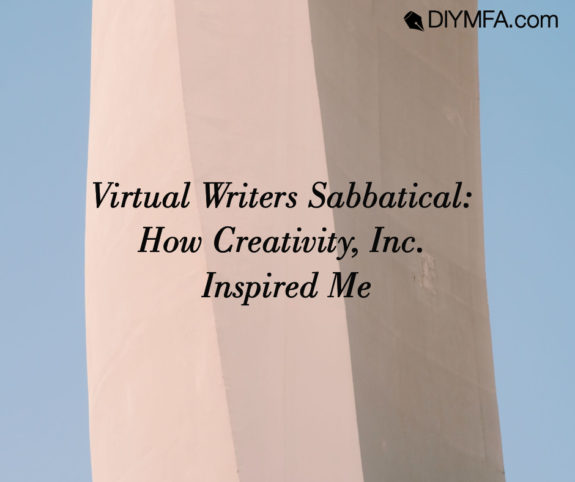Have You Accepted the Challenge?
I challenged you in April to embark on a 2021 Virtual Writers Sabbatical, which is a build your own adventure focused on you and your writing craft. If you’ve already joined, I’m glad to have you along for the tour. If not, it’s never too late to break out of your bubble. Check out Create Your Own Virtual Writers Sabbatical, which includes a Sabbatical roadmap.
Here’s a recap of my Sabbatical destinations:
- completing a book coaching class;
- improving my Show, Don’t Tell skills;
- doubling down on my writing community and critique group involvement;
- reading multiple books on creativity, story building, coaching, and editing, and rebooting my fiction reading; and
- binge watching TV shows and movies set in Ireland and the U.K. as research for my story.
Initially I thought my selections were unrelated, but I’ve learned my picks have common threads.
Lessons From Buzz Lightyear and His Friends
Creativity, Inc. Overcoming the Unseen Forces that Stand in the Way of True Inspiration by Ed Catmull with Amy Wallace was my first read under #4. Catmull, a Co-Founder and President of PIXAR Animation, shares many of his career’s mistakes and wins while working for George Lucas and Steve Jobs and at PIXAR and Disney Animation. Whether you grew up watching Star Wars or PIXAR favorites, such as Toy Story and Cars, you will find Catmull’s recounting of what went on behind the scenes entertaining.
Catmull provides a fresh perspective on creativity and effective ways to nurture it while building a stronger business organization. However, his ideas are easily applied to writers. I’ve already tested a few of his lessons.
1. Share Your Work Early and Often
Don’t wait for things to be perfect before you share them with others. Show early and show often. It’ll be pretty when we get there, but it won’t be pretty along the way. And that’s as it should be.
Creativity, Inc., page 318
While working on my first novel, every point in the process has been a learning curve for me… until it’s not. One hurdle I had to tackle was sharing my work with others. I knew intuitively that I needed to have others’ eyes on my work in order to strengthen my writing, but trusting others with my story, not to mention my heart and dreams, was a scary thing. I knew that as an introvert and perfectionist just getting comfortable with sharing my early drafts (i.e., the “just get it on the page and expect it to be messy” drafts) was going to be a feat in itself. So, at the end of last summer, I enrolled in DIY MFA’s small group coaching program.
You may be surprised that my primary reason wasn’t to push me closer to finishing the first draft of my novel, which it definitely helped me do. Rather, I did it to force myself to become more comfortable with sharing my work. First, I would gain an instant critique group without having to search and test one out. Second, I would receive critiques while I was early enough in my draft for it to make a meaningful difference. Finally, receiving more feedback faster would help me quickly develop the thick skin I knew I needed to query agents.
It turned out I was shortsighted about how powerful and effective critiques can be when done well with the right partners. I loved every minute of the program, and I realized afterwards that I’d set the bar too low by only hoping to learn how to bounce back faster from receiving constructive feedback. Instead, I should have been focusing on the power of tapping into a brain trust.
2. Writing Can Be a Team Sport
Candor isn’t cruel. It does not destroy. On the contrary, any successful feedback system is built on empathy, on the idea that we are all in this together, that we understand your pain because we’ve experienced it ourselves…The Braintrust is fueled by the idea that every note we give is in the service of a common goal: supporting and helping each other as we try to make better movies.
Creativity, Inc., page 104
Novel writing is a solo sport. I knew when I started that I would spend most of the time in my head talking to my characters, and I was okay with this. But over time I realized just how solitary that experience can be, and I was craving good old-fashioned people connections.
Our coaching program ran for an intense three months. A year later, most of our cohort is still actively supporting each other’s writing, including creating spin-off critique groups, which inspired #3. Already, my days of fear and dread at sharing my work are gone. Instead, I’m excited about each step of the critique group process—submitting, reviewing, and exchanging feedback. Each step is another opportunity to grow.
The members of my spin-off group write in multiple genres and have different writing styles, strengths, weaknesses, and blind-spots. I receive real-time feedback on my story, characters, and my practicing #2. I pick up new techniques and styles to test. I watch up close how other writers create. Each call leaves me re-energized to work on my story. I knew we would learn from each other. But I didn’t realize that this new writing community was my own missing link.
3. Collaboration is Key
Every creative person…can draft into service those around them who exhibit the right mixture of intelligence, insight, and grace.…Andrew Stanton says…‘The people you choose must (a) make you think smarter and (b) put lots of solutions on the table in a short amount of time.’…Seek out people who are willing to level with you, and when you find them, hold them close.
Creativity, Inc., page 105
My group has only been up and running for half a year, but there’s already been a subtle shift in our discussions. It can be hard to process constructive feedback no matter how gently and respectfully it’s provided, but I’ve noticed a trust in each other has already formed. And we’ve switched from straight feedback to brainstorming solutions together to help each writer accumulate as many ideas and perspectives as possible. It’s always up to each writer to decide what does and doesn’t work for their story. But I love the idea of writers helping writers, especially when we’ve been hanging out in our heads with our characters for a little too long.
This collaboration between writers is something I hear too little about, but I’m so grateful to have it in my writer’s toolkit. It’s also made me realize I’m interested in #1 because a book coach collaborates with writers to help them write the best book they can. But more on that in a future post.
Share Your Adventures
So that’s how a book about animated characters taught me that the most important thing I’d overlooked as a newer writer was my ultimate success will depend not only on my own creativity and writing skills, but also on the support of the other writers and coaches I have in my corner.
Have you added someone to your corner lately?
What did you think about Creativity, Inc.?
Let us know in the comments or on social media!

Richelle Lyn is a compensation & benefits attorney and HR executive, who is now chasing a career as a writer. Her favorite reads are suspense, mystery, and contemporary women’s fiction. She is writing her first YA suspense novel. She loves her tea hot and her coffee iced. She calls South Florida home, but her favorite place to be is on a trip. You can check her out on Twitter and Instagram.







